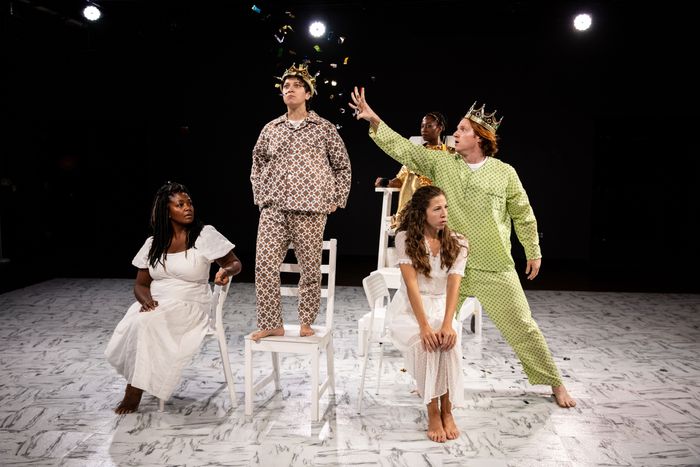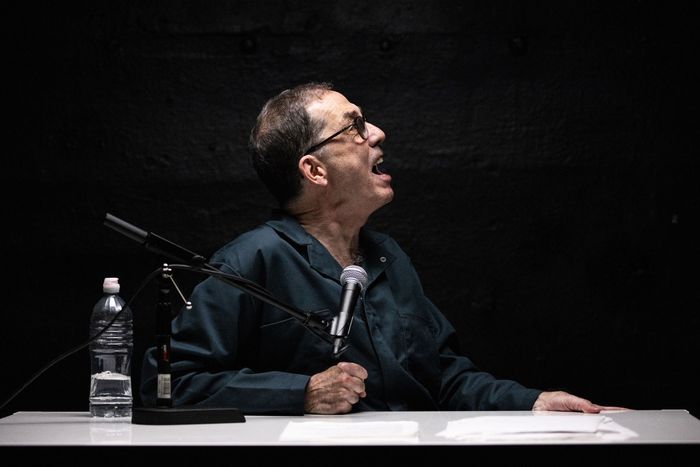
Helen., with that terse little dot at the end, is a manifesto of a title. It says: There is no ÔÇ£of Troy.ÔÇØ I am not the cause or the crux of your war. I am only myself. Full stop. WeÔÇÖre used to things beginning with Helen ÔÇö all those ships ÔÇö but here, it would seem something ends with the infamously beautiful Spartan princess.
Sadly, powerful manifestos can lead to imperfect revolutions, and feminist revisions, in their aim of busting through old stories, can sometimes forget to write new ones. Playwright Caitlin George is interested in the domestic cycles that have historically trapped and defined women ÔÇö birth, marriage, motherhood, death ÔÇö and in the accompanying cycles of violence that are often driven by men, both inside the home and outside of it. But while Helen. spends a lot of time declaring its heroineÔÇÖs liberation from those ancient prisons, it spends much less filling her out as a human being, rather than an agency-seeking missile. ÔÇ£Keep walking. Where? DoesnÔÇÖt matter. ItÔÇÖs all in the journey,ÔÇØ she says, ÔÇ£I have direction.ÔÇØ Somewhat ironically, Helen circles back to those last three words over and over again throughout the play ÔÇö┬áthey become her refrain. Perhaps theyÔÇÖre even true, but direction without depth makes for a pretty flat line.
George begins her play with a prologue spoken by Eris, the god of chaos (a velvet-voiced Constance Strickland, decked in gold sequins). He ÔÇö or she, or they; Eris seems to be down with any of the above ÔÇö will be our emcee, guiding us through the chapters of HelenÔÇÖs story. With Chaos as a narrator, you might well think you need to strap in and hold on tight, but though Helen. incorporates plenty of anachronism and breezily un-Homeric banter, the play never really diverges that far from the larger contours of its source material. The major difference: Here, Helen (Lanxing Fu) isnÔÇÖt spirited away by Paris (Jonathan Taikina Taylor, who also plays a strapping, clownish Agamemnon). She just leaves. ÔÇ£Who did this?ÔÇØ demands her husband, Menelaus (Jackie Rivera). HelenÔÇÖs sisters, Timandra (Melissa Coleman-Reed) and Klaitemestra (a compellingly self-possessed Grace Bernardo), can only shrug. ÔÇ£She wanted to leave, and then she left,ÔÇØ Klaitemestra replies.
Taylor, who is tall, elastic-limbed, and flame-headed, and Rivera, who is diminutive and constantly seesawing between BDE and hapless confusion, get real mileage out of Agamemnon and Menelaus. Strutting and glory-obsessed in their plastic crowns and patterned pajamas (some of the stronger work by costume designer James Schuette, who also created the showÔÇÖs simple, wide-open set), they easily read as children ÔÇö John and Michael ready to go fight pirates. As they swagger and pose and fail to compute simple information (and as MenelausÔÇÖs crown slips repeatedly down over his face), their double-act quickly becomes some of the most entertaining work in the production.
This is both enjoyable ÔÇö itÔÇÖs nice to be entertained ÔÇö and frustrating. Why, in this project of female liberation, must the men still get all the best bits? So theyÔÇÖre stupid, fine ÔÇö theyÔÇÖre still stealing (and in this case, really stealing) the show. Must freedom from domestic servitude and misogynist narratives preclude humor?
ItÔÇÖs not that George writes Helen and her sisters with constant frowns and furrowed brows, but even as the men are released into clowning, the women are often stuck in chairs making tart small talk. Helen. is written in a heightened, self-consciously quirky patter, even down to the scriptÔÇÖs character descriptions ÔÇö Timandra: Eldest. Klaitemestra: Middle. Helen: Period. Sentences are short, repetition is frequent, banality and clich├® are regularly and deliberately deployed:
Helen: What day is today?
Timandra: Laundry.
Klaitemestra: The next day ÔÇö
Helen: Yesterday was ÔÇö
Timandra: Tomorrow is a new day.
Helen: But which day is it?
Timandra: Joy in work.
Klaitemestra: A job well done.
Timandra: Never half do a job.
Helen: Tomorrow is ÔÇö
Klaitemestra: Kitchen. Clean the cupboards.
Helen: Oh, the cupboards.
As with the menÔÇÖs dingus-y-ness, the womenÔÇÖs staccato domestic chorus is clearly intentional ÔÇö yes, these women are trapped ÔÇö but the intended effect is missed. Director Violeta Picayo keeps the stylized language ticking along at speed, but all too often the text skates past without penetrating. GeorgeÔÇÖs dialogue has an archness and, eventually, a sameness to it: WeÔÇÖre kept at armÔÇÖs length from these people, outside their heads and hearts. Their mythos might be cut down to size, but they remain creatures of surface.
There is an exception amongst the playÔÇÖs women, and thatÔÇÖs RiveraÔÇÖs wily, gripping performance as Hekuba (apart from Fu and Strickland, all the playÔÇÖs actors take on multiple roles). Showing up, as she does, in sackcloth and ashes during the fall of Troy, bereft of her ancient husband and her dozens of children, this Hekuba is part Elaine Stritch, part semi-feral orphan. Rivera flashes between amused existential cynicism and animal aggression, and when they meet FuÔÇÖs Helen, they quickly leap onto her back and hang on for most of their scene together ÔÇö a sly, suffering homunculus who has no mercy and has been shown none. (Picayo is also a choreographer, and the precise, playful movement vocabulary sheÔÇÖs built with the actors goes a long way in keeping us engaged.)
Eventually, Hekuba turns into a dog.┬áLetÔÇÖs not bother about why ÔÇö the point is, Rivera remains exciting to watch, even bounding around the stage barking. Throughout Helen., they add the kind of dimension, both comic and tragic, that the play so needs. In their performance, one senses the potential for a weirder, wider-ranging, more truly chaotic journey. Slamming the doors on a house as big and familiar as the Iliad is a tough and worthy project, but as it is, for all its ambition, GeorgeÔÇÖs play never quite leaves the front porch.
_
For highly stylized language to become a playÔÇÖs true engine, an audience needs to feel the psychophysical surges and swells underneath a text, no matter how defamiliarized its sound. ItÔÇÖs no easy feat. It takes writerly guts and actorly chops to venture forth into a play where, say, for 75 minutes, one performer sits alone at a desk, armed only with microphone and water bottle, and tells us a story in a made-up language. But then, sometimes, you get a writer with Jerry LieblichÔÇÖs jangling, jaunty flair for hyper-structured grotesquerie, and an actor with Steve MellorÔÇÖs combination of lingual agility and unblinking, steam-from-nostrils commitment to the bloody viscera beneath the words, words, words.
In LieblichÔÇÖs Mahinerator, Mellor plays a nameless bureaucrat in an ever more nauseating version of the apocalyptic future. HeÔÇÖs here, as before a tribunal, to tell us the story of his glorious rise and calamitous fall. But first ÔÇö or rather, simultaneously ÔÇö we must adjust our ears to the surreal word salad that is his native tongue. A sample: ÔÇ£NowÔÇÖs I reckon what I gathered up my thoughtly bits and reasonated up what when I seized this stacka pancakes down he didnÔÇÖt have nuthin on me.ÔÇØ
Echoes of A Clockwork Orange reverberate in the distance, but Lieblich is doing something even more sliced-and-diced: ItÔÇÖs as if someone dropped the note cards containing the entire English language, then tried to pick them up. Some got lost entirely, some got stuck together, some fell in a puddle and got smeared into different words entirely ÔÇö┬áand, anyhow, the world is a melting cesspit, and why bother remembering the words for ÔÇ£grassÔÇØ and ÔÇ£treesÔÇØ if your job is in fact to eradicate any remaining ÔÇ£greenibitsÔÇØ that ÔÇ£persistethÔÇØ? As Mahinerator chugs along ÔÇö powered by MellorÔÇÖs churning indignation and his masterly articulation of the arc of a thought ÔÇö this food-processor-ing of language is revealed, for all its playfulness, to be a tool of the ultraviolence that has reduced the world to lifeless, ÔÇ£stinklyÔÇØ rubble. LieblichÔÇÖs verbally virtuosic play is an eerily funny, deeply chilling demonstration not simply of the banality of evil, but of its absurdity.
Helen. is at LaMaMa through October 29.
Mahinerator is at the Tank through October 22.



